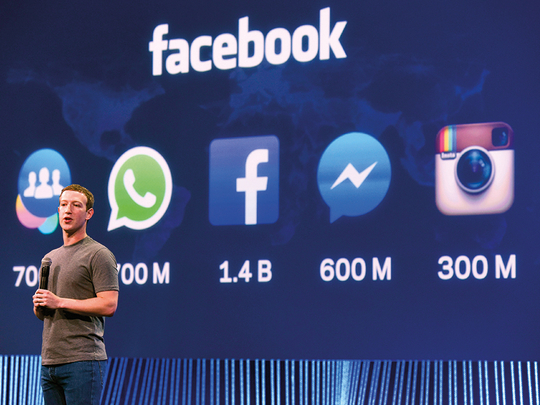
Dubai: Move over FAANG, the key word for market experts is MAGA right now. And don’t get it wrong. MAGA in this instance is not code for ‘Make America Great Again’; instead, it stands for Microsoft, Apple, Google and Amazon stocks.
The infrastructure-oriented nature of MAGA stocks has been a huge drawcard for investors at a time the revenues of some FAANG — Facebook, Apple, Amazon, Netflix and Google — stocks have been strained, with Facebook being the posterchild for these woes.
Having posted lower-than-expected results recently, Facebook warned that its growth rate would experience a decline in the high single-digit range.
Other tech stocks such as Twitter, Amazon, Netflix and Google also tracked weakness in Facebook shares, with the exception being Apple.
Key risk
“That changed in the second-quarter earnings season with Facebook’s shock miss, including lower operating margins going forward, amid massive spending in infrastructure and security. The key risk going forward is the downward trajectory of Facebook’s margins, which could offset most of the revenue growth from [the] monetisation of WhatsApp, Instagram, and Messenger,” Garnry said.
Difficulties in getting revenues from the other brands is resulting in market experts diverting their focus on MAGA stocks, which are expected to be more stable as they are more infrastructure oriented.
Hostile regulators
“Firms such as Microsoft, Apple, Amazon, Netflix, and Spotify are also using user data but it’s not their core product. These companies derive their revenue from selling a service or product free of advertising,” Garnry said.
“Facebook, Alphabet/Google and Twitter are synonymous with selling ‘free services’ in exchange for user data and serving online ads, and these companies will find themselves in an increasingly hostile environment from regulators.”
So far FAANG stocks have outperformed MAGA stocks — not withstanding the fact that Apple, Google and Amazon make up both subsets.
FAANG stocks have gained an average of 33 per cent so far in the year, compared to a 29 per cent rise in MAGA shares.
Apple shares
Investors are now looking at Apple shares through a different prism altogether.
Apple forecast revenue of $60-$62 billion (Dh220.38-Dh227.72 billion) for its fiscal fourth quarter, beating the $59.6 billion analysts had expected, according to data from Thomson Reuters.
“China has been a source of investor concern since Apple China revenues peaked in 2015. We saw the first sign of strength in China last quarter and investors will look for that momentum to continue.”
Apple shares rose more than 2 per cent on Thursday, building on the previous session’s 5 per cent gain to trade at $205.52. The gains have resulted in the company’s market capitalisation crossing the $1 trillion mark.
Tech sector outlook
UBS has a neutral rating on the information technology (IT) sector in the United States.
Lefkowitz expects the tech sector to perform in line with the market in the months ahead.
“The sector’s PE [price-to-earnings ratio] is 13 per cent higher than the market, in line with its long-term average. In addition, the relatively full valuation does not account for the risks of increased regulations for the internet names or the fact that earnings growth for the tech sector will be largely in line with the market over the next few quarters as other sectors benefit from tax reform and higher commodity prices,” Lefkowitz added.












